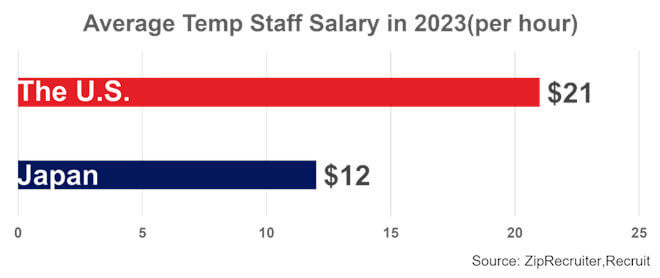How Using Temporary Staff in Japan Can Cut Costs and Solve Workforce Issues.
June 29, 2023
With Japan’s low unemployment rate and high job-to-applicant ratio, many businesses are struggling to find the right staff to fill vacancies. Competition for talent is fierce and is driving up both recruitment and long-term labor costs, placing an unnecessary burden on businesses.
While foreign companies entering the market focus on obtaining permanent hires, local companies with greater knowledge of the options available are increasingly shifting to temporary staff solutions to cut costs and find the staff they need.
This article explains and compares the different types of employment found in Japan, then discusses the advantages offered by Japanese temp staff solutions and the differences with similar solutions in other countries.
Table of Contents
1. Types of Employment in Japan
There are four categories of employment in Japan: permanent, contract, part-time and temporary. They differ in several keyways that impact both employers and the employees.

1-1. Permanent Full-time Employees (Sei-sha-in)
These are conventional company employees. They work full time in accordance with the Labor Standards Law which specifies their regular working hours as well as how much overtime they are able to do. Once they are hired, they obtain legally protected long-term job security (it is very difficult to terminate permanent employees) and will most likely work for the same employer until retirement. They also enjoy a range of employment benefits such as social insurance which covers 30% of medical expenses, paid vacations, and childcare leave.
1-2. Contract Employees (Keiyaku sha-in)
A contract employee in Japan, on the other hand, is someone who works under a fixed-term contract for a company. These contracts typically have a maximum term of three years. However, for those who are 60 years of age or older or are considered specialists with a high level of experience, the maximum contract period can be extended to up to 5 years.
When this period ends, the contract can either be renewed or terminated. However, under Japanese labor law an employee who has worked for the same company for a total of 5 years or more as a contract worker, is eligible to switch to permanent employee status with all the protections and benefits available to them. If the contract worker has become an integral part of a company’s business, the company is usually happy to take them on permanently. However, some companies terminate employment prior to 5 years because they do not want to take on the burden of additional permanent staff.
Compared to permanent employees, contract workers are more easily terminated since they do not have the same legal protections. This means that companies can respond quickly if a worker’s performance does not meet expectations or the business’ economic situation changes. On the downside, companies still have the expense of recruitment, orientation and training.
1-3. Part-time Employees (Arubaito)
Part-time workers are hired by Japanese companies on fixed-term contracts but work a maximum of 28 hrs per week. Because arubaito contracts offer flexibility in terms of working hours and no restrictions on the number of jobs a person has, it is a common option for students, homemakers and people between jobs in their chosen careers.
The application and employment process can be streamlined, and the period of employment can vary. Most part-time workers earn much less than permanent employees doing the same work and may not receive the same benefits.
1-4. Temporary Employees (Haken sha-in)
Japanese temporary staff, like those in other countries, are dispatched by a staff supply company to a client’s business.
The main difference between a contract and a temporary employee is who has responsibility for their employment. Contract employees have a contract directly with the company where they actually work, but temporary employees’ contracts are with staff supply companies.
This is where the similarities between temporary staffing in Japan and in other countries end. Now let’s look at the differences.
2. How Japanese Temporary Staffing Solutions Differ to Those in Other Countries
There are three core differences.

2-1. Purpose
The first and perhaps the biggest difference is the purpose companies have for taking on the temporary staff. In Western countries, temporary staff services are often used when companies have an urgent and immediate need to fill a key position in their workforce. Japanese companies, however, use temporary staff services primarily to fill non-key roles and to reduce costs and increase flexibility.
As mentioned earlier, once people have been taken on as Seisha-in (permanent employees), companies must guarantee benefits, salary increases, and bonuses and it becomes extremely difficult to terminate their employment, even when cutting labor costs would help protect a business’ future. Permanent employees are, therefore, significant cost centers for Japanese companies and can hinder their ability to respond to changing situations.
2-2. Salary
Another key difference between Japanese temp staff services and those overseas is the overall salary level. Research by ZipRecruiter recently found that the average hourly pay for temporary staff in the U.S. is $21. This compares to just $12 in Japan (across all industries).

This gap reflects the different purposes for using temp staff services in the two countries. In Japan temp staff are often placed in general clerical positions.
2-3. Contract Length
The final difference can be found in the contract period for temporary staff. The United States Department of Labor states that a temporary worker can only be in a position for a maximum period of less than 12 months. Anything longer, and the employee must be treated the same as permanent staff.
In contrast, Japanese temporary staff can work in the same company’s organizational unit for up to three years.
However, this limit does not apply to temporary staff who:
- are permanent employees of the staff supply company
- are 60 years or older
- are working on fixed-term projects
- are working for a period that is limited to a fixed number of days (number of work days in a month is less than half compared to that of regular employees and less than ten days a month)
- are working in place of an employee who is taking maternity leave, childcare leave or family care leave.
- change departments in the middle of a three-year period
All ISF NET’s temporary staff are permanent ISF NET employees, so there is no limit on their placement with our clients.
3. Key Advantages of Japanese Temporary Staff Services
Now that we have looked at the different types of employment in Japan and the core differences between temp staff services in Japan and overseas, let’s focus on the benefits of using temporary staff services:

- Increased Efficiency
- Cost Reduction
- Workforce Flexibility
- Access to Experienced Personnel
- Increased Efficiency
Taking on temporary staff increases the smooth running and efficiency of a business. It takes the hassle out of recruitment and training and, by assigning tasks to experienced temporary staff, core employees can focus on developing and expanding the business. - Cost Reduction
While the basic cost of each temporary employee depends on their individual skills and abilities, the total labor cost burden is less than that of permanent employees. This is because using temp staff reduces costs to companies in terms of hiring, training, and ongoing benefits. - Workforce Flexibility
Temporary staff services allow companies to respond quickly to new business opportunities and changes in technology. Companies can find and use skilled staff as their requirements change, as well as rapidly expand or reduce their labor forces as needed. - Access to Experienced Personnel
Experienced temporary employees with extensive experience and knowledge in different industries can provide immediate and stable service without additional training and can contribute to the knowledge base of the client company.
Japanese companies are already taking advantage of these benefits. If you are looking to build a successful business in Japan, you should too.
Return to the page of Managed Service of the bilingual help desk and onsite | ISF NET, INC.